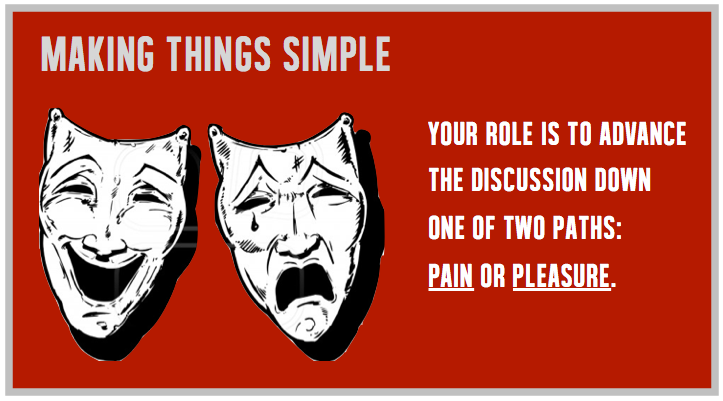Well, of course, the answer is “you shouldn’t!” But, lest you think I’ve lost my mind (which is entirely possible) let me explain.
An article–a good one–in the NY Times Sunday by Dan Mitchell about the shifting power from manufacturer to retailer (as in Wal-Mart) prompted this post. Mr. Mitchell has some great content–but there is more to the story.
This article begs the question: who should be in control between buyer and seller?
In our training business, that is one of the fundamental shifts sellers must make mentally–that they should be in control. But when I read an article like this, it reminds me of how much work there is to be done on the matter.
There is a common belief that “buyers” should have control becuase they have the money. But that’s absurd. I believe “sellers” should be in control because they have the solution to the buyer’s problem. And the solution has to be worth more than the money (if it isn’t, then you, the seller, have more work to do on your value).
If you or your sales team feel that the buer has the control, then you have set yourself up for a career of begging and averageness.
There are three things that must be in place though before you can call yourself a follower of this new method.
1. Abundant Market. You have to believe that your market is abundant. If you can get there “mentally” then you can detach from the outcome. The person who is least invested in getting their outcome, is the one with the power. The way you get to that belief is to create a “possibility plan” of all the people (companies) who have problems that you can solve.
Companies that sell to large firms get mentally yucked up by saying to themselvs “yes, but there are only so many Wal-Marts.”
2. Effective Process. You have to have an effective sales process that contains a step for finding the problem–so that you have something to link your solution to. If you are one of those “quote and hope” people, not really concerned with the prospect’s pain, then you will be out of control. Your process must have their best interest in mind–the best solution.
3. Ideal Client Mentality: Not everyone is for everyone. Yet, when sales teams go to the market, they try to make everyone a prospect. Instead of this strategy, change to an “ideal client strategy.” In that method, you admit to yourself (and other human beings) that not every prospect is a good one. And that in order to provide “optimum value” for your client, they must fit. If they don’t, then move on.
This entire new way of thinking gives power to the selling organization with a big “however.” Mr. Mitchell is right when he says sellers that are forced by big customers to impose sorely needed discipline on their processes actually come away from the fray stronger and leaner. So, in a way, the control that your customer exerts on you can help you become better. But you still need control.
 On this episode of The Advanced Selling Podcast, veteran sales trainers Bill Caskey and Bryan Neale address the concept of decision making.
On this episode of The Advanced Selling Podcast, veteran sales trainers Bill Caskey and Bryan Neale address the concept of decision making.
